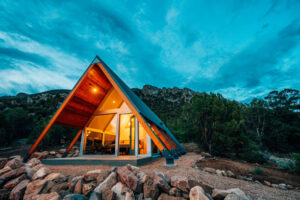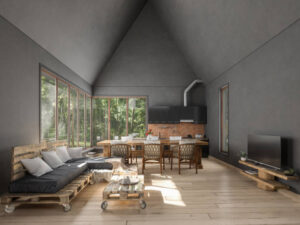
The draw of tiny home living
In an era characterised by environmental concerns, economic realities, and a growing desire for minimalism, the concept of tiny home living has gained remarkable popularity. Tiny homes are compact, efficient living spaces that prioritise functionality, sustainability and a simplified lifestyle. For those considering a shift towards this unique way of living, the benefits extend far beyond the reduced square footage.
Embracing sustainable living through tiny homes
Sustainability is at the forefront of global consciousness, and tiny homes provide an ideal platform for putting eco-friendly principles into action. Tiny homes inherently have a smaller carbon footprint due to their reduced energy consumption, materials usage, and overall impact on the environment. These dwellings encourage the use of energy-efficient appliances, LED lighting, and often incorporate renewable energy sources such as solar panels.
By choosing tiny home living, individuals contribute to reduced resource consumption and play a significant role in preserving the planet for future generations.
Financial freedom and affordability
The financial benefits of tiny home living are substantial and often the initial draw for many individuals. The reduced construction costs, lower utility bills, and minimal maintenance requirements make tiny homes an economically sensible choice.
For those looking to own a home - without the burden of a hefty mortgage - tiny home living offers an opportunity to achieve homeownership without being tied down by excessive debt. This financial freedom allows residents to allocate resources towards experiences, travel, and personal growth rather than being shackled by mortgage payments.
Simplification and decluttering
In a world where material possessions can become overwhelming, tiny homes encourage a more minimalist lifestyle. The limited space forces residents to prioritise what truly matters, leading to a conscious decluttering of belongings.
This shift towards simplicity and minimalism can have profound effects on mental well-being and overall happiness. With fewer material possessions to manage, individuals can focus on experiences, relationships, and personal growth, leading to a more fulfilling and purpose-driven life.

Connection to nature and the outdoors
Tiny homes often prioritise outdoor spaces, blurring the boundaries between indoor and outdoor living. The limited interior space encourages residents to spend more time outdoors, fostering a deeper connection to nature. This lifestyle shift can have positive effects on mental health, reducing stress levels and promoting a sense of calm and tranquillity.
Additionally, tiny homes can be designed with large windows, allowing residents to enjoy stunning views of the natural surroundings and immerse themselves in the beauty of the outdoors.
Customisation and personalisation
Despite their compact size, tiny homes offer ample opportunities for customisation and personalisation. Every inch of space can be designed to meet the individual's needs and preferences. From multi-functional furniture to clever storage solutions, tiny home living encourages creative thinking and innovative design. This level of customisation ensures that each tiny home is a reflection of its owner's personality and lifestyle - leading to a sense of ownership and pride.
Community and connection
The ‘tiny home movement’ has cultivated a strong sense of community and connection among like-minded individuals. Tiny home enthusiasts often gather at events, workshops, and online platforms to share experiences, ideas and advice. Living in a tiny home community provides a unique opportunity to foster deep connections with neighbours, creating a supportive and tight-knit environment. This sense of belonging can be particularly valuable, especially in a society where social isolation is a growing concern.
Transforming lifestyles
Tiny home living represents a transformative lifestyle choice that brings together sustainability, financial prudence, and a redefined sense of freedom. By embracing a smaller ecological footprint, individuals contribute to a more sustainable future. The financial advantages allow for increased flexibility and reduced financial stress. The pursuit of simplicity and minimalism fosters a deeper connection to what truly matters. Customisation empowers individuals to design a living space that aligns with their values and needs.
Ultimately though, the benefits of tiny home living extend far beyond the confines of a physical dwelling; shaping a way of life that prioritises mindfulness, community, and harmony with the environment. As the tiny home movement continues to gain momentum, it offers a compelling path towards a more intentional, fulfilling and sustainable future.
Carl Dodd, Property Revolutions Ltd.

